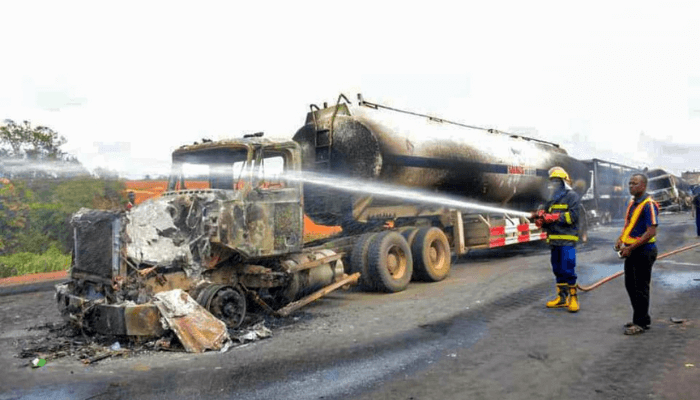The federal government is considering banning 60,000-litre petroleum tankers following a rise in fuel truck accidents that have claimed 493 lives in under three years.
At a stakeholders’ meeting in Abuja on Wednesday, the government proposed capping tanker capacities at 45,000 litres to reduce the frequency and severity of explosions.
According to Farouk Ahmed, Chief Executive of the Nigerian Midstream and Downstream Petroleum Regulatory Authority (NMDPRA), 11 petrol tanker accidents in 2024 alone resulted in 341 deaths and 124 injuries, while five incidents this year have already led to 121 fatalities and 79 injuries.
“The public is watching helplessly and expecting intervention to protect lives and property,” Ahmed said, emphasizing the urgent need for enhanced safety measures.
The government has already implemented several safety measures, including:
- Minimum Industry Safety Training for Downstream Operators (MISTDO) for drivers and personnel.
- Mandatory installation of anti-spill safety valves on tankers.
- Safe-to-load initiatives for screening tankers before departure.
- Colour coding and branding of tankers for easier identification.
- Spot checks on drivers for fatigue or intoxication.
However, Ahmed noted that recurring accidents suggest either non-compliance or defects in existing measures.
While safety concerns remain high, Yusuf Othman, President of the National Association of Road Transport Owners (NARTO), warned that banning 60,000-litre tankers could lead to N300 billion in financial losses.
Othman revealed that about 2,000 such trucks, each costing over N150 million, were financed by banks.
“We acknowledge the need for safety, but banning these trucks could have severe financial consequences. These vehicles are built with strong engines, and the real issue is poor road conditions and lack of driver rest areas,” he argued.
He urged authorities to prioritize road maintenance and driver health checks, noting that Nigeria’s entire fuel distribution system relies on trucks.



























